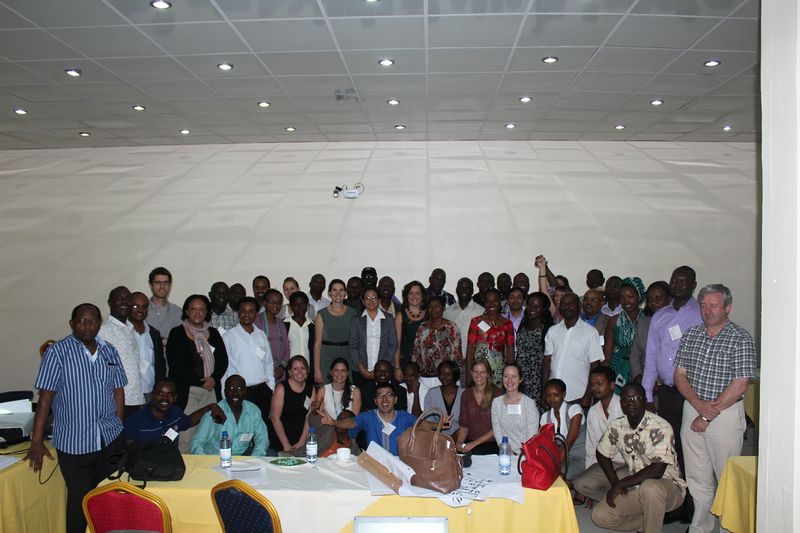DATABASE
Safe Access to Fuel & Energy (SAFE) in Humanitarian Settings: Training for Implementers in Kigali, Rwanda
completed
Country
Rwanda
Budget
0 - 500.000 $
Year
2014
Issue
Solutions
Link
cleancookstoves.org
Abstract
Global Alliance for Clean Cookstoves, WRC, and UNHCR held a training in Rwanda for 68 humanitarian staff on Safe Access to Fuels and Energy (SAFE) in humanitarian settings. The skills-based workshop trained those working with refugees and internally displaced people (IDPs) in East Africa to better recognize, assess, and respond to energy needs.
Project Description
The Global Alliance for Clean Cookstoves, Women's Refugee Comission, and UNHCR held the first-ever training on Safe Access to Fuels and Energy (SAFE) in humanitarian settings in June, 2014 in Kigali. This skills-based workshop trained staff working with refugees and internally displaced people (IDPs) in East Africa to better recognize, assess, and respond to energy needs. In total 68 humanitarian staff participated in the training, coming from 15 countries. They represented more than 25 organizations and the governments of Kenya, Ethiopia, and Rwanda. The first several days included training on SAFE program design and planning, energy technology selection, implementation, and M&E. Classroom-based trainings were followed by a joint field mission to Kigeme camp for participants to speak with refugees, view ongoing energy projects, and collectively develop recommendations on how to improve these refugees’ lives. During the field visit, participants found a surprising problem reiterated by refugees: the wood ration was always wet. Refugees used the firewood ration for cooking while it was still damp, which reduced fuel efficiency and increased emissions. The solution recommended by participants was seemingly simple – distribute dry wood instead of wet. While the process was complex and required follow-up advocacy, in November the Rwandan government announced that it would begin purchasing only dry wood for distribution to refugees. This positive policy change is linked in large part to the SAFE training.
BENEFICIARIES
Direct beneficiaries were the 68 humanitarian staff from 15 countries that participated in the training. Indirect beneficiaries were the 2.4 million refugees living in East Africa under the care of the organizations that participated in the training.
Results
The training resulted in policy change on camp fuel provision in Rwanda that will directly benefit more than 72,000 refugees in Rwanda by reducing cooking emissions and increasing fuel efficiency. It also built the capacity of 68 humanitarian staff members to recognize, assess, and respond to the energy needs of the 2.4 million refugees living in the East Africa region. A test administered at the end of the training evaluated participants’ levels of knowledge, and showed that they had learned the advantages and disadvantages of different fuel types, technologies, and M&E methodologies. Once participants apply this knowledge to their humanitarian programs, the training is expected to result in improved energy access for refugees and internally displaced people (IDPs) throughout East Africa with benefits for their health, livelihoods, and environment.
Business Model
The SAFE training materials been made available on the SAFE website for others to use and reference, and will be expanded in 2015 into a formal curriculum that will be used to train SAFE experts. Policy changes in Rwanda that occurred as a result of the training will have long-term impacts on quality of life and health for refugees, as the provision of dry wood instead of wet will reduce emissions and increase fuel efficiency.
Lessons Learnt
A major takeaway from the SAFE workshop was the importance of incorporating exercises that allow for practical application of knowledge into trainings. The field visit to Kigeme camp proved the perfect opportunity for participants to apply their newly learned knowledge, and ended up resulting in unexpected policy change that will directly benefit more than 72,000 refugees living in Rwanda.
Key Feature
The SAFE training represented the gains that can be made through partnership and collaboration. UNHCR, the Alliance, and WRC agreed to jointly host the training as part of their work on the SAFE Steering Committee, an interagency consortium that works on energy access issues in humanitarian assistance. These three organizations brought strengths and inputs to the training that would not have existed without meaningful collaboration. For example, the Alliance contributed its DFID funding to provide lodging, transportation, and conference facilities for participants, and paid for WRC to help develop the curriculum. UNHCR provided access to the refugee camps for the field visit, and was able to leverage the training to conduct their own national SAFE strategy planning workshops immediately afterwards. WFP, another member of the SAFE Steering Committee, also leveraged the training to discuss and plan its SAFE energy interventions for 2015.
Main Donor
DFID
(International agencies)
Implementing Actor
Global Alliance for Clean Cookstoves (NGOs)

